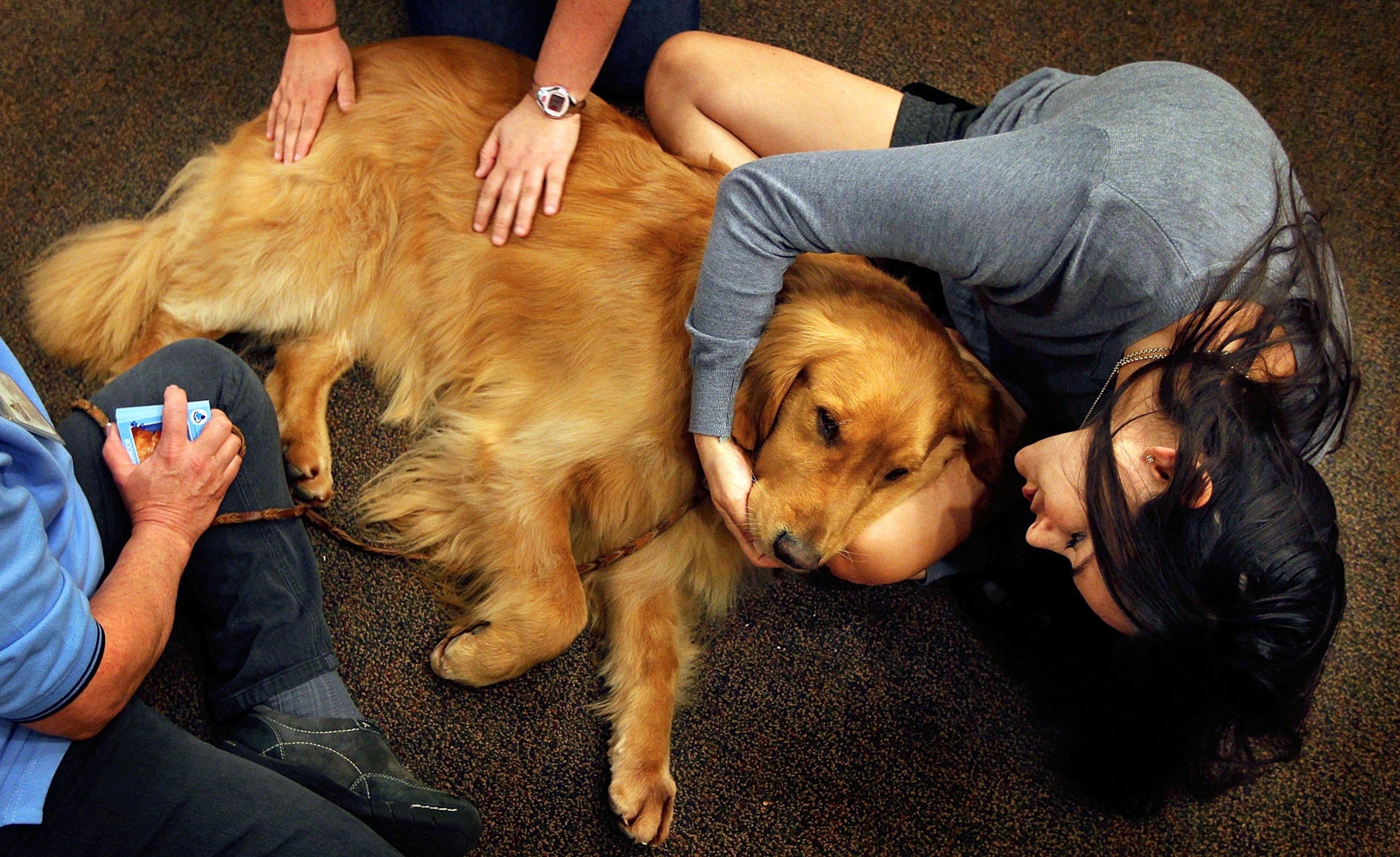
After the Bombing, Comfort Dogs Come to Boston
Specially trained golden retrievers show the healing power of dogs.
Comfort in the form of five tail-wagging, furry-faced golden retrievers has been dispatched to aid those reeling from the Boston marathon bombing.
The dogs are specially trained therapy dogs brought to Boston by Lutheran Church Charities. They will be stationed at the First Lutheran Church of Boston, a few blocks from where bombs exploded at the marathon finish line on Monday.
The dogs have reassured people following crises like shootings and natural disasters, and they regularly visit nursing homes. Tim Hetzner, the team leader for the Lutheran Church Charities K-9 Comfort Dogs, said he got the idea after seeing how well students responded to therapy dogs in the wake of a 2008 school shooting at Northern Illinois University.
In Boston, like on their other visits, he'll take the dogs only where they're invited and will be careful to let people approach the dogs instead of vice versa, in case anyone is afraid of or allergic to the animals. The dogs are scheduled to stay in the area until Sunday.
In December, some of the same dogs went to Newtown, Connecticut, to comfort children and adults in the wake of the shooting at Sandy Hook Elementary.
After that event, National Geographic's Amanda Fiegl interviewed Tim Hetzer about the work of the K-9 Comfort Dogs, and delved further into the healing power of dogs. Here is an excerpt from her report:
The Human-Canine Bond
Why does petting a dog make us feel better? It's not just because they're cute, says Brian Hare, director of Duke University's Canine Cognition Center.
The human-canine bond goes back thousands of years. Dogs descend from wolves and have been attracted to humans ever since we began living in settlements-a source of tasty garbage. That created an advantage for wolves to live near humans, and since it tended to be the less aggressive wolves that could do this more effectively, they essentially self-domesticated over time, according to Hare.
Part of what makes dogs special is that they are one of the only species that does not generally exhibit xenophobia, meaning fear of strangers, says Hare.
"We've done research on this, and what we've found is that not only are most dogs totally not xenophobic, they're actually xenophilic-they love strangers!" Hare said. "That's one way in which you could say dogs are 'better' than people. We're not always that welcoming."
People also benefit from interacting with canines. Simply petting a dog can decrease levels of stress hormones, regulate breathing, and lower blood pressure. Research also has shown that petting releases oxytocin, a hormone associated with bonding and affection, in both the dog and the human.
Do Dogs Have Empathy?
In situations like the Newtown shootings, it makes a lot of sense that dogs would be an effective form of comfort, says psychologist Debbie Custance of Goldsmiths College, University of London.
"Dogs are social creatures that respond to us quite sensitively, and they seem to respond to our emotions," she said.
Custance recently led a study to see whether dogs demonstrated empathy. She asked volunteers to either pretend to cry, or just "hum in a weird way." Would the dogs notice the difference?
"The response was extraordinary," she said. Nearly all of the dogs came over to nuzzle or lick the crying person, whether it was the owner or a stranger, while they paid little attention when people were merely humming.
"We're not saying this is definitive evidence that dogs have empathy-but I can certainly understand why people would think they do, at least," Custance said.
Other animals can also be useful in what's known as "animal-assisted therapy." The national organization Pet Partners has 11,000 registered teams of volunteer handlers and animals that visit nursing homes, hospitals, schools, and victims of tragedy and disaster. Although most of the teams use dogs, some involve horses, cats, rabbits, guinea pigs, birds, and even barnyard animals like pigs and chickens.
The presence of an animal can help facilitate a discussion with human counselors or simply provide wordless emotional release, said Rachel Wright, director of Pet Partners' therapy animal program. The group plans to deploy several teams of therapy dogs to Newtown in the near future, working closely with agencies that are already present in the community, she said.
To some, the idea of sending a dog to a grieving person might seem too simplistic. But Custance says that very simplicity is part of what makes the connection between humans and canines so powerful.
"When humans show us affection, it's quite a complicated thing that involves expectations and judgments," she said. "But with a dog, it's a very uncomplicated, nonchallenging interaction with no consequences. And if you've been through a hard time, it's lovely to have that."